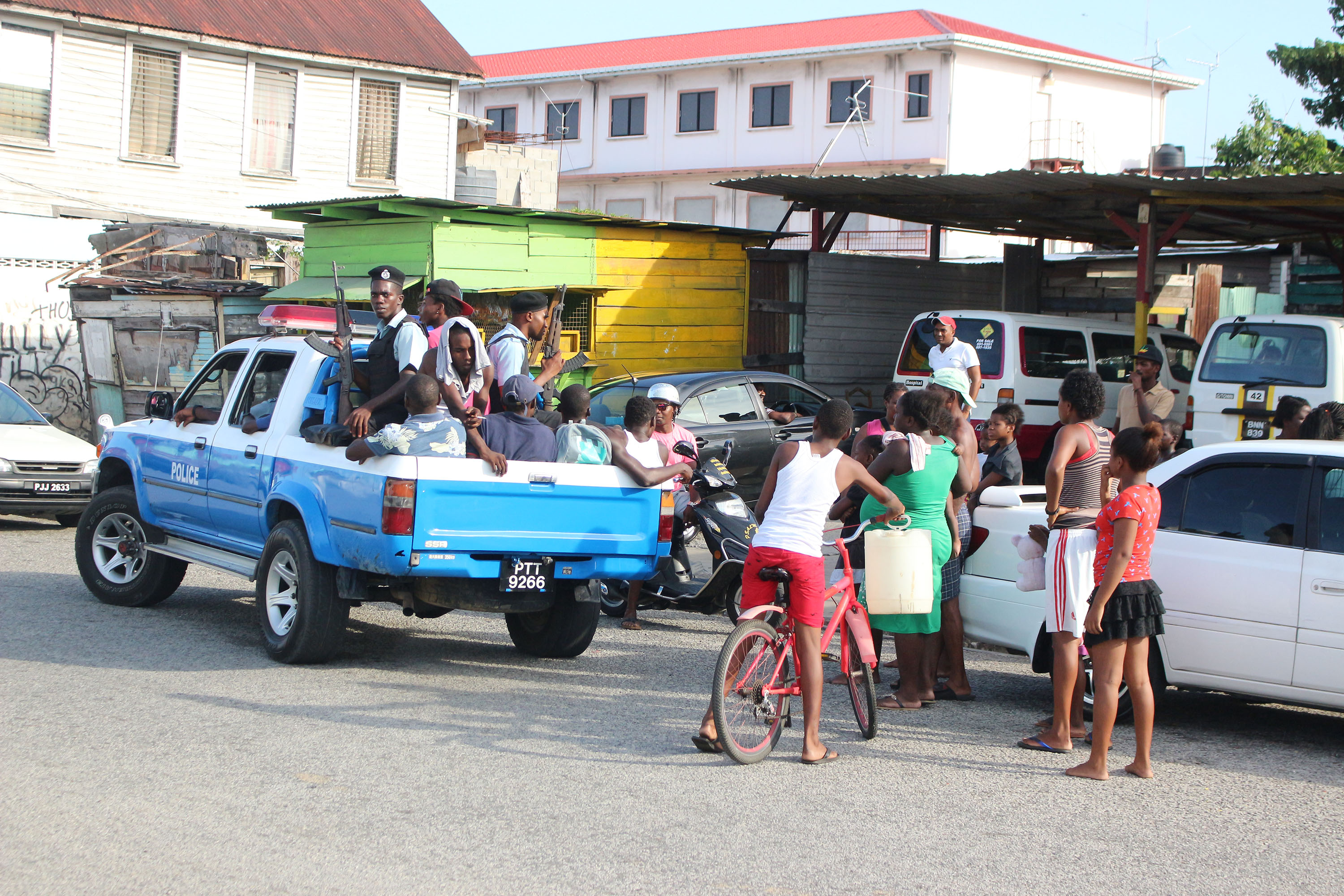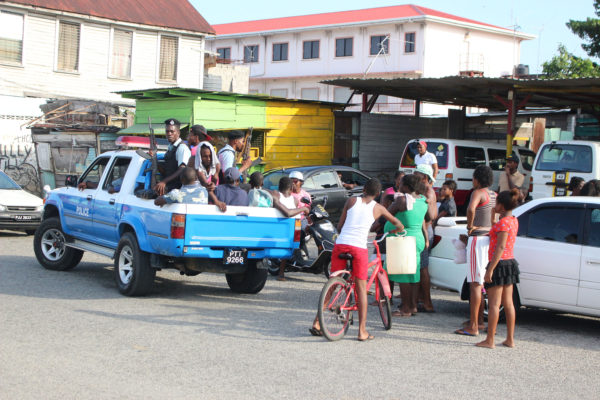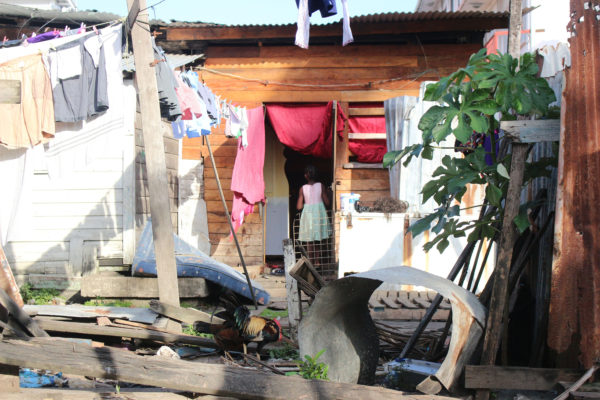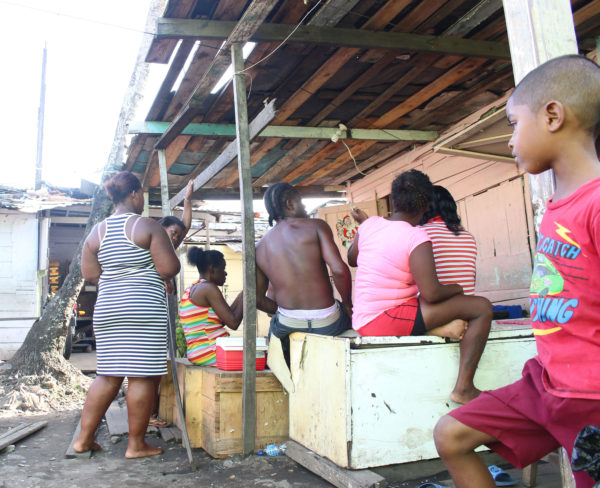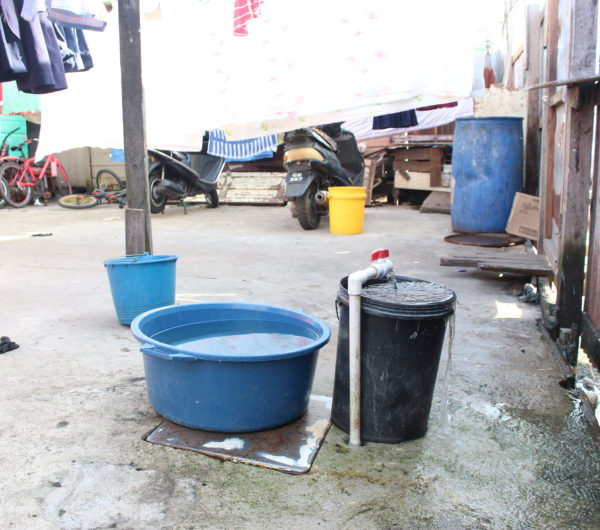It’s Saturday afternoon and children, freed from the responsibility of having to prepare for school the next day, spend the time playing on the street. Three little boys, aged eight or nine, race each other as they roll truck tyres down Saffon Street all the way to the corner of Broad Street, then back again. One block away on Lombard Street, a haphazard collection of shacks face the Guyana National Industrial Company (GNIC) wharf. In a gap between two rows of shacks, young children bathe at a standpipe their bodies perched over a clogged drain. It is this collection of homes, this Lombard street community, that a team from the Inter-American Commission on Human Rights (IACHR) described as living in “extreme poverty.”
A statement from the IACHR on the September 21 to 23 visit said in part, “During its visit to the neighbourhood of Lombard Street, the IACHR delegation was shocked by the extreme poverty and precarious living conditions of its inhabitants. The community comprises approximately 40 adults and 80 children with clear housing, sanitation, and health problems, as well as limited work opportunities and scant social services provided by the State.”
When Stabroek News visited the area yesterday, the issues raised by the IACHR team were evident as were their needs and wants.
They want land. They need access to more space so that they could build a community which is both physically and psychologically healthy.
“What children see that’s what dey are gonna wanna become. Nobody want dey children become what dey see going on here. We need land. People with their little children want to move out from here. People need to go somewhere with space where you can bring up your children in your own way. You need your own place to bring up your children you own way,” Amanda, a resident of the area told Stabroek News.
Five minutes into the interview, it became clear what Amanda doesn’t want her children to see. A police van laden with armed officers and several young men turns the corner and begins to search several of the young men sitting in front of the yard.
It is high drama as several women gather their sons into the shacks and shout for their partners to stay inside.
As shocking as it appears, for the residents, this is normal. When challenged one of the officers tells Stabroek News that the exercise is a routine stop and search and residents support his account.
“This is regular thing. Almost every weekend dey does show up here and pick up people. Last night dey say they looking for some lil boy that tief a police gun and dey busy shooting off in Albouystown like dey head ain’t good,” one resident says.
Tensions ratchet higher when someone shouts, “Dey carrying Scooby.”
“You see how dey stay. Look how dey does not pick up people children just so dry. Mek sure you tape them,” a woman called Pinky demands.
As Scooby calmly climbs into the police van someone tells Pinky that the officer found a joint on him. Another man explains that it is probably just an identification parade they are taking them on.
“If is a ID parade dey gon bring dem back. But like how dey find Scooby with weed dey could do he anything,” he says adding sagely, “dey just gotta be careful and don’t change dey shirt or nothing. Sometime de colour of you shirt could get you jail.”
He has lived in the area all his life and has been on many ID parades. He is not alone. Amanda explains that some people have lived in this space for 35 years, some for 45 years she herself has always lived here.
Asked about the visit by the IACHR team which was accompanied by Minister of Social Protection Volda Lawrence the residents are mostly indifferent. They promised nothing beyond a second visit and the residents have been visited many times before, they are not interested in visits or promises only land.
They have been able to provide themselves with the basic amenities. There are small shops selling groceries, there is running water and electricity, but not directly from the Guyana Power and Light. As Amanda puts it, “Is the ghetto, remember; everybody must find a way to get light.”
Told that Minister Lawrence has pledged to continue to work to improve the situation and opportunities of the community’s residents, the residents stare blankly. Amanda flippantly says, “Okay.”
The IACHR’s statement has called on the State to adopt urgent steps to improve the socioeconomic status of the Lombard Street residents and to create, immediately and without delay, conditions that allow them to exercise all their human rights.
